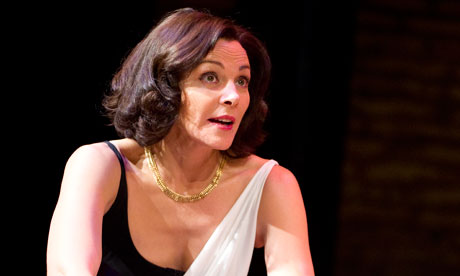 Kim Cattrall is a ‘finely gauged’ Cleopatra at the Liverpool Playhouse. Photograph by Tristram Kenton
Kim Cattrall is a ‘finely gauged’ Cleopatra at the Liverpool Playhouse. Photograph by Tristram KentonJanet Suzman was a dazzling Cleopatra nearly four decades ago. Now she directs her own daringly intelligent, challenging and occasionally puzzling production. It starts with a great, rolling, sonorous grunt of a snore. Antony, that “triple pillar of the world”, lies sleeping, sprawled on the floor, his head lolling on Cleopatra’s lap, mouth gaping wide. He is bare-chested and his once-powerful muscles saggingly expose a man well past his prime. The queen of Egypt bends to rap his skull with her knuckles: does she want to wake him for the pleasure of lovers’ play or because his abandoned, noisy body disgusts her – or a little bit of both? This unsettling ambiguity is the only constant in their playful, passionate, bitter encounters. Kim Cattrall and Jeffery Kissoon are cleverly cast, since each carries an aura from a previous role that lends lustre to the part they play: he as the great warrior Karna from Peter Brook’sMahabharata and she as Samantha, Sex and the City’s love ‘em and leave ‘em, 40-something vamp. Does Cleopatra love Antony or does she love the fact that he is one of the three most powerful men in the Roman empire?
- Antony and Cleopatra
- Playhouse,
- Liverpool
- Starts 8 October
- Until 13 November
- Box office:
0151 709 4776 - everymanplayhouse.com/
For these two, the personal can never be untangled from the political since every move they make is overshadowed by the threat of Rome – literally, in Peter McKintosh’s soaring set with its towering stone walls, iron girders, glass walls and overhanging gantry looming above and around the glittering oriental lamps and sumptuous fabrics of the Egyptian court. Octavius Caesar, in Martin Hutson’s riveting interpretation, is Cleopatra’s dark-suited, nervy, uptight counterpoint. In his buttoned-up Roman way, he, too, loves Antony, praising his military virtues with a starry-eyed admiration. Although he coldly calculates Antony’s destruction, this pursed-lipped Caesar weeps helplessly at the news of his idol’s suicide and, having wiped clean the sword on to which the old soldier fell, he reverently tucks his bloody handkerchief into his breast pocket, as though it were a precious relic.
It is at the point of death that Kissoon’s Antony is most ridiculous and most sublime. By this point, Cattrall’s Cleopatra has been so finely gauged, so quick to switch between histrionics, coquetry and calculation (when Antony is absent she settles spectacles on her nose, a chair at her desk and busies herself signing papers of state) that we still cannot tell whether she loves him or not. The result is that Antony’s extreme grief at the fake news of her supposed suicide, instead of being a dramatically ironic expression of tragic and ennobling love is so ridiculously bathetic (especially when contrasted with his raw cry of pain on hearing of the death of his friend Enobarbus) that the press-night audience laughed. More shocking than the sound of the laughter was the realisation that it was appropriate, a sort of emotional palate-cleanser to prepare for the end. Antony the soldier having been bested in battle by Caesar, it is now the turn of Cleopatra the seductress to be spurned by the self-satisfied Roman. Both have been defeated by the new order; there is no place within it for their messy complexities. It is death that brings them grandeur; united in death, they rob Caesar of the triumph of his conquest. But even this efficient Caesar turns to his advantage. As he orders the lovers to be buried together, attended by “solemn show”, his eyes slide from side to side as if surveying the reactions to his magnanimity – he is using the funeral to win their friends to his side.
Suzman’s production takes a great risk by harshly depicting a world where politics is as important as passion and, for the most part, it pays off. Some other directorial choices, though, were not so effective. In particular, why cast the unfortunate Mark Sutherland as Octavia? This bizarre piece of cross-gender casting made a burlesque of Antony’s marriage to Caesar’s sister and gave a far too literal reading to the idea of Roman virtues being masculine. Although Ian Hogg’s Enobarbus and Aicha Kossoko’s Charmian were both splendid, others of the cast seemed too young and inexperienced, as if the acting budget had been blown on the leads. Overall, like Shakespeare’s serpent of old Nile herself, flawed but fascinating.
No comments:
Post a Comment
Feel free to comment on this post...